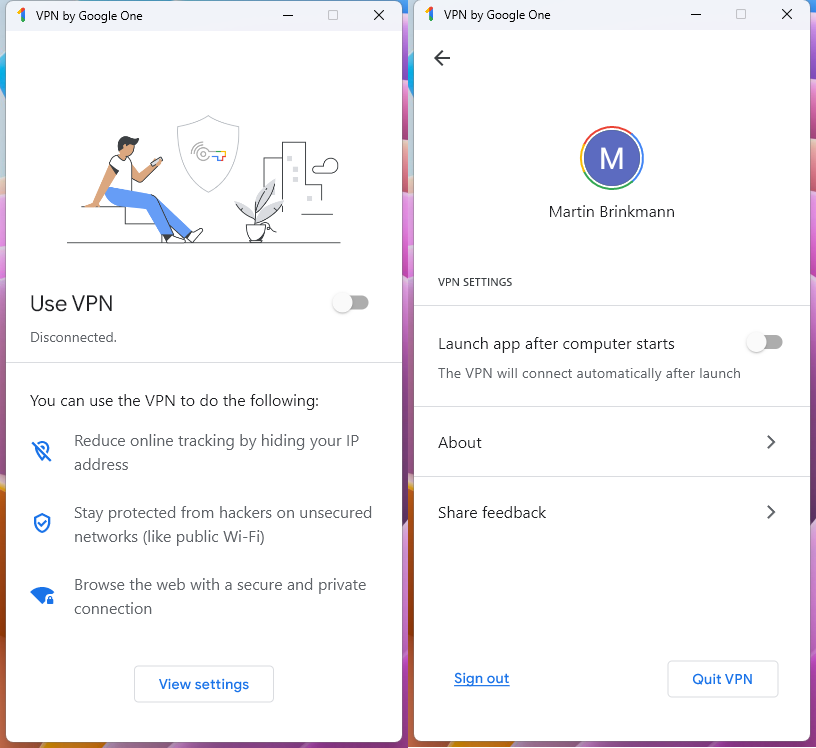VPN by Google One is the most basic VPN that you can get

Google introduced support for its VPN service to all Google One plans recently. Previously, only customers who subscribed to the 2 terabyte plan, which is available for $9.99, had access to the VPN. Now, all paying customers, including those paying $1.99 per month for the Basic plan, get access to the VPN.
Access to a VPN for $1.99, plus additional storage, better customer support and some extra features; sounds like a good deal on paper for users who are invested in Google's ecosystem.
Google promises that its VPN does not "use the VPN connection to track, log, or sell your online activity". In 2021, Google hired NCC Group to audit the VPN by Google One. A focus of the audit was to "assess the product’s technical security properties and review its associated privacy claims".
NCC Group provided the following summary about the privacy claims: "To deliver on its privacy claims, the product introduces supplemental cryptographic measures to disassociate Google user identities from tunneled VPN traffic. While these measures do not categorically eliminate the opportunity for Google to circumvent its privacy claims, they do provide a structural framework within which the application can provide authentication and authorization for users without sending identifying information to the VPN exit nodes".
Google limits access to its VPN to select regions currently. It supports 22 countries currently, including Germany, France, Canada, United Kingdom, United States, Taiwan and Japan. Customers who reside in these countries get access to the VPN if they sign-up for a paid Google One plan. These customers may use the VPN in other countries and regions as well, for instance, while traveling.
VPN by Google One is available for the mobile operating systems Android and iOS, and the desktop operating systems Windows and macOS. Customers may use the VPN on up to six devices.
VPN by Google One usage

Google One customers who install the VPN software on their desktop systems may be disappointed by the lack of options that it provides. It features an on-off switch prominently, and a look in the settings reveals only one option: to launch the app when the computer starts, so that the VPN connection is established immediately.
The desktop application lacks features that the mobile version supports. The mobile Google One application offers two additional features:
- bypass the VPN connection for select applications.
- block the Internet connection if the VPN connection dies.
That's it on that front.
The applications lack any other options. Connections are automatic, and there is no option to select a target region or country for the connection. Google does not even display the connected country or any other connection information.
There is no option to select a protocol for the connection, enable security features, or use advanced options, such as the chaining of VPN servers or something like NordVPN's Meshnet feature. There is not even an option to connect to the VPN automatically under certain conditions, or to set a custom DNS provider.
Google's VPN protects the user's IP address and data while active; this prevents that ISP's collect and sell traffic data, or check what a user's is doing. The VPN can't be used for other common activities, such as bypassing geographical restrictions, or P2P downloading.
Closing Words
VPN by Google One lacks most of the features that popular VPN solutions offer. While it is still sufficient for some use cases, especially protecting the Internet traffic and a user's privacy by hiding the device IP, it lacks even the most basic features.
Now You: do you use a VPN?



















A privacy tool by Google, what a stupid idea.
And more generally speaking, Tor Browser can replace a VPN.
Maybe not so private and/or secure, but it’s relatively easy to set up SSH on an AWS server [or Google Servers]. It helps for little things. I think there are directions/scripts for Outline VPN, Wireguard, or OpenVPN.
Plain, vanilla SSH offers enough privacy/security for most.
EC2, Free Tier.
Once per blue moon I use the free version of Proton VPN. It only gives me three countries and causes problems with email providers wanting assurance “its me” if I forget to shut down Thunderbird but is good enough for my usage.
Incidentally and OT, rebuilding its global database seems to have rectified my Thunderbird issues.
Mullvad accepts cash payment. That’s something. But yes, can you trust them? Sweden’s military/ police intelligence legislation and Mullvad: https://mullvad.net/nl/help/swedish-legislation/ The problem here is: what you can say today, can tomorrow be forbidden, free speech is not becoming easier so to say.
Opera>VPN> is free for some regions. I dont trust Google either.
I don’t use any VPN and even less any proxy. Should I ever it’d be TOR, no other and especially none provided by Google. As noted by the article, “[…] sounds like a good deal on paper for users who are invested in Google’s ecosystem.”. I’m not. Not at all. I mean really not.
Quoting as well NCC Group’s summary, “[…] While these measures do not categorically eliminate the opportunity for Google to circumvent its privacy claims […]”
That means Google remains technically capable of circumventing its privacy claims. Of course relying on a company’s well-known ethics should wipe all doubts.
But isn’t Tor just a giant Fed honeypot, Tom? I recall articles last year about how the Feds appeared to be taking over a large number of Tor relays. Certainly they’ve been in control of some number of exit nodes for years. I’ve used Tor Browser in the past, but only for simply anonimizing, never for anything important.
So, if you have something to hide, don’t use TOR and if you have nothing to hide other than you bought hundreds of jars of peanut butter, why put up with the s.l.o.w internet speed and rubbish search results it manages to deliver. .
Might be, Andy. I recall having read an article (or was it a comment?) stating that 3-letter agencies were particularly invesetd in tracking Tor and Linux users, FWIW. Frankly I don’t know, which is also why Tor would be the one VPN should I ever consider using any : extremely conditional. This said i’d rather be tracked by the ‘Feds’ than by commercial intelligence, given dark undergrounds aren’t my places of predilection :=) I like light. Consider two hermetic rooms, one enlightened and the other in total obscurity : if you pierce a hole the size of a needle (and far less even!) it is the light that invades the darkness and not the other way around. Life conquers emptiness. Anyway, there I go again. We’ll stick on “direct” connections (and try to bypass “in-betweens”!).
>”This said i’d rather be tracked by the ‘Feds’ than by commercial intelligence”
Yeah, but if it’s a Fed honeypot, then it’s probably there in order to eventually catch a large group of criminals in a vast dragnet. I’d rather not be the innocent fish who gets caught up with all the sharks in that net.
This comment got a friend of mine and myself on a conversation. I was told “light may indeed invade darkness but darkness happens to swallow light”, referring to so-called “black holes”. Bothers my conclusion, “Life conquers emptiness” which might not be a universal allegory. Darn!
Hard NO (!!!!!) on this one. How can anyone possibly trust a Google VPN???
Why would you even trust a third party VPN provider you don’t even know? that’s a much better question. And I don’t. As the saying goes. Better with the devil you know, that the one you don’t. Because at the end of the day all you doing by using a third party VPN is exchanging your info from Google to the people you don’t even know…and trust me, most of VPN providers are proven liars when they say they do not keep logs…it’s not true, they all do.
I don’t see a VPN option on $1.99 plan…it’s only for Premium
Google is rolling this out over time. May take days/weeks before everyone has it.
Irony at it’s best!
The number 1 personal data pirate wants to sell you privacy!
My Precious!
Exactly. My Android phone tracks my every step.
Paid VPN are useless due to the fingerprinting tracking. They hide nothing.
You can use the Chameleon extension with Firefox and constantly spoof and change all the characteristics for your browser fingerprint. Sites that try to track your browser will not be able to keep up with the constantly changing fingerprint. If you also reduce/eliminate javascript and delete all cookies as soon as you leave a site then it will be nearly impossible for them.
@Andy Prough thanks! :]
Mullvad and AirVPN. Nothing else.